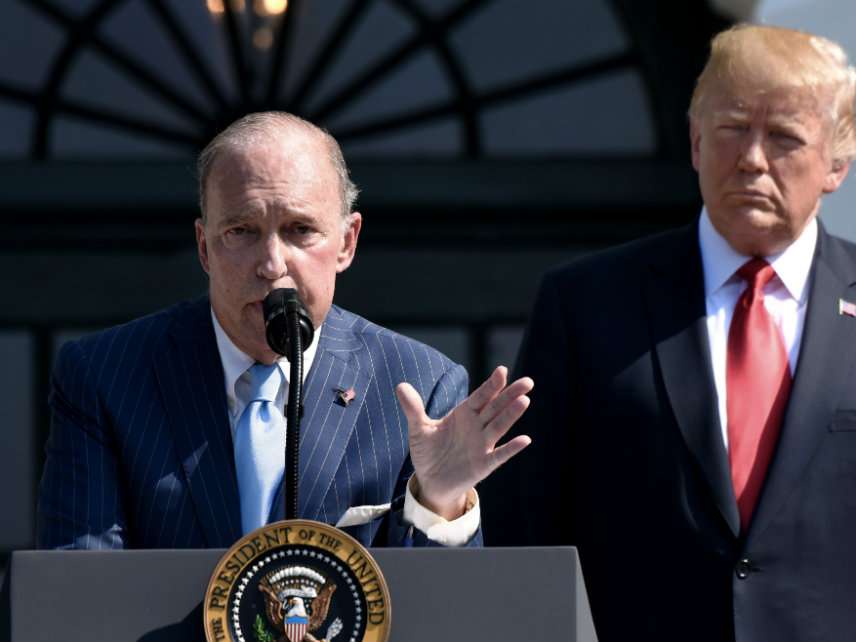Trillion-Dollar Deficits Are Nearly Here. Thanks, Republicans!
At nearly every opportunity, the GOP has made the nation's fiscal outlook worse.

The Congressional Budget Office projected in April that the federal budget deficit would hit $804 billion this year, and would top $1 trillion by 2020, two years earlier than previously projected.
Last week, the CBO reported that the federal government had already spent $895 billion more than it brought during the first 11 months of the fiscal year, an increase of $222 billion over the same period of time last year. Trillion-dollar deficits are very nearly here.
It's no secret why. Over the past year, Republicans at the federal level have cut taxes while signing onto bipartisan deals to increase spending. They have made the deficit larger at nearly every turn, and there's no sign they plan to stop.
Just this morning, President Donald Trump tweeted his displeasure with a bipartisan spending measure that passed in the Senate earlier this week. "I want to know, where is the money for Border Security and the WALL in this ridiculous Spending Bill, and where will it come from after the Midterms? Dems are obstructing Law Enforcement and Border Security." Trump had demanded $5 billion in spending for a border wall; the deal Senate Republicans cut with Democrats provides $1.6 billion. Trump, in other words, was upset because the plan doesn't spend more.
Yet the foundation of the latest budget deal, much like the spending planned signed earlier this year, is an agreement to spend more—on everything. The deal spends $11 billion more on the Labor, Education, and Health and Human Services departments than the Trump administration requested. That's what Democrats wanted in exchange for agreeing to a $17 billion year-over-year increase in military spending, according to The Washington Post. The two parties reached a deal by giving both sides what they want: more spending.
President Trump, meanwhile, wants even more spending—a lot more—in the form of a trillion-dollar infrastructure bill financed entirely by debt. Indeed, according to Axios, Trump rejected a proposal from former White House adviser Gary Cohn to spend $200 billion in federal funds in hopes of leveraging state and local dollars. Trump preferred an idea put forth by Democrats to put the entire infrastructure bill on the federal tab. "We've just gotta spend money on this," Trump reportedly said.
Trump wants to spend money—but Republicans don't want to raise more revenue to pay for it.
Last year's tax bill added more than $1.5 trillion to the next decade of federal deficits, and now House Republicans are pushing a second package of tax cuts that would add another $3.2 trillion. The second round of tax cuts isn't likely to become law, but a separate bipartisan package rolling back a variety of health care taxes has a real shot. That plan, which is driven by Republicans but has previously found some Democratic support, would add $59 billion to the deficit over the next decade—and more like $73 billion including interest.
Trump's top economic adviser, Larry Kudlow, said this week that he was skeptical that tax cuts drove deficit increases. Kudlow, who earlier this summer falsely argued that last year's tax bill had already brought the deficit, said that he wished the current deficit were lower, but it's "not a catastrophe."
Anyway, he said, deficits are a product of too much spending. "We spent too much, I absolutely agree," Kudlow said. "Down the road of course we'd like to slim that down as much as possible." This is the way it always is with Republicans: tax cuts now, spending reductions later.
The federal deficit is a product of the difference between tax revenues and government spending; when countries, including the United States in the 1990s, have reduced their deficits, it has typically involved a mix of spending cuts and tax hikes. Kudlow, like most Republicans, wants to look only at one side of the ledger.
It is of course possible to substantially reduce the deficit exclusively via spending cuts. But Trump and his fellow Republicans have demonstrated repeatedly that they have no interest in the cutting spending at the scale that would be necessary. On the contrary, they have shown that they will accept higher spending for Democratic priorities in exchange for higher spending on Republican priorities, and they will pair these spending increases with tax reductions that increase the deficit even further. Kudlow may want to reduce spending down the road, but his party appears bent on increasing it now. And that, of course, is the same path that Republicans took under President George W. Bush. When the GOP has had power, it has cut taxes, but the spending cuts to match have never arrived.
Years of rank deficit hypocrisy on the part of the GOP helped pave a political pathway for Democrats who would like to increase spending even more whenever they have the opportunity. Republicans have contributed to an already troubling political dynamic that is likely to make the problem worse.
Kudlow may be right, in a narrow sense, that this year's high deficit is not a catastrophe—at least for the moment. But just because fiscal ruin has not yet descended upon us does not mean it will not arrive eventually; the nature of debt crises is that everything is basically fine until, one day, it's not. The federal government's debt and deficits have been a catastrophe in waiting for years, and under Trump the Republicans have made the problem worse.
*CORRECTION: A previous version of this story incorrectly stated that the CBO had updated its deficit projection for the current fiscal year to $1 trillion.


Show Comments (218)